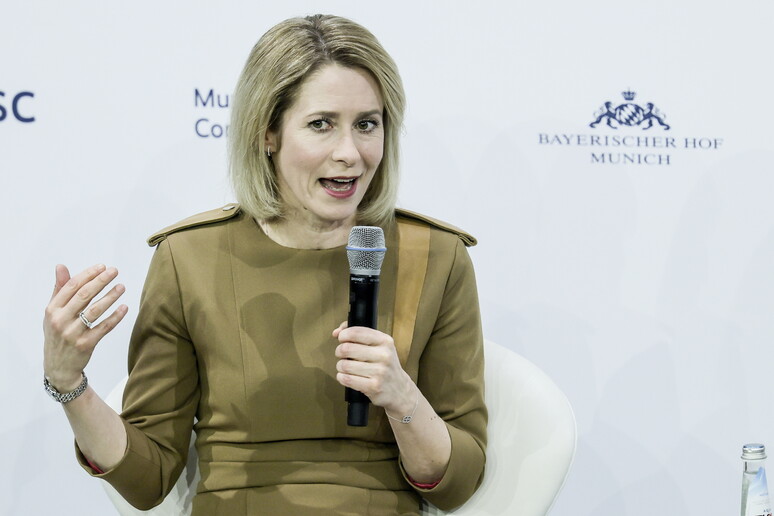In an interview with the European
Newsroom (enr), EU foreign policy chief Kaja Kallas talked about
a recent flashpoint in Africa - and if and how the EU needs to
adapt its development work policies after President Trump
slashed US aid programmes.
The High Representative of the European Union for Foreign
Affairs, Kaja Kallas, said she has included Latin America,
Africa and other regions in a map of areas where the European
Union should be more present.
"Regarding Africa and Latin America […] I asked my services to
make a map of countries that we have not covered," that is, she
specified, where there have been no high-level visits in the
last three years by members of the European institutions or EU
countries.
Sub-Saharan Africa, Latin America and the Pacific were mostly
the blind spots in those years. "I have asked the foreign
ministers to go to different places, but also the
commissioners," she said.
The European Union's chief diplomat said that she is working on
a "stronger response" from the EU to the conflict between the
Democratic Republic of Congo (DRC) and the Rwandan-backed March
23 Movement (M23) rebel group.The M23 has occupied mineral-rich
Congolese provinces.
The European Commission announced at the end of January that the
EU is evaluating its cooperation with Rwanda, considering
Kigali's support for the M23.
But she added that for that all 27 member states needed to make
a unanimous decision. "That is, once again, a problem, but I am
working on it."
She pointed to the "dilemma" that Rwanda was involved in that
conflict while at the same time was involved in EU-funded
peacekeeping efforts in Mozambique.
One of the options would be the suspension of the Memorandum of
Understanding (MoU) on sustainable value chains for critical raw
materials with Rwanda, as well as the application of European
Union (EU) sanctions. The EU and Rwanda struck a deal concerning
the acquisition of strategic raw materials for the European
bloc's energy transition.
On Thursday, in a resolution the European Parliament called for
the suspension of the MoU and demanded Rwanda withdraw from DRC
territory and cease its cooperation with the M23 rebels.
Kallas suggested the creation of a Kimberley Process - the
process of certifying the origin of diamonds to prevent the
purchase and sale of diamonds from areas of conflict, civil wars
and human rights abuses - but for essential raw materials. "We
need something like this for essential raw materials […] if a
country is attacking another country, taking over the mines and
selling these raw materials as if they were its own and can
finance its war with these raw materials," she said.
Since 1998, eastern DR Congo, a former Belgian colony, has been
plunged into a conflict fuelled by rebel militias and the army.
Compensating for US Cuts
On the side of development aid, the latest US decisions to cut
development aid have thrown up a number of questions - to some
of them the EU will have to find answers: Its aid strategy will
have to change.
Asked whether the European Union will be able to fill the
financial gap that the United States are going to leave after
President Trump announced the cancellation of around 40 billion
dollars a year in international aid, Kallas said that this was
an issue that has been addressed with all the agencies and
institutions responsible for foreign action.
The European Union intends to compensate for the loss of US
development aid payments only under certain conditions and in
selected cases, Kallas, told the enr journalists.
Moreover, European aid is also to be used in future to expand
geopolitical power. Kallas argued that the EU must rethink its
strategic influence. "We have to be more visible," she
concluded.
Payments could be linked to the recipients openly and clearly
communicating that they are supported by the EU, Kallas said.
She complained that the EU currently supported many
organisations with substantial funds but was scarcely visible.
She said the current situation was an opportunity to show the
affected countries and EU citizens where the support truly comes
from and that the European Union is the international partner
that is reliable and predictable.
Kallas cited the Palestinian Authority and the UN Relief and
Works Agency for Palestine Refugees in the Near East (UNRWA) as
examples. "We are the largest supporters, and nobody knows,"
said EU foreign policy chief. "We get a lot of criticism that
we are not supporting Palestine enough, although we are the ones
who are supporting Palestine: It's not the Arab countries, it's
us in terms of the funding."
US President Donald Trump has ordered a temporary halt to
almost all overseas development aid payments. These are
currently under review and shall only be resumed if they are
"efficient" and align with Trump's "America First" strategy.
Trump also said the US would withdraw from financing UNRWA.
According to figures from the Organization for Economic
Co-operation and Development (OECD), in 2023, the US was the
world's largest single provider of public development aid,
amounting to nearly 65 billion Dollar. However, collectively,
the EU and its member states reached nearly 96 billion Euro in
the same period.
This article is published twice a week. The content is based on
news by agencies participating in the enr, in this case ANMA,
ANSA, dpa, EFE, and Lusa.
ALL RIGHTS RESERVED © Copyright ANSA











